分词作状语练习题解析
分词作状语练习题解析
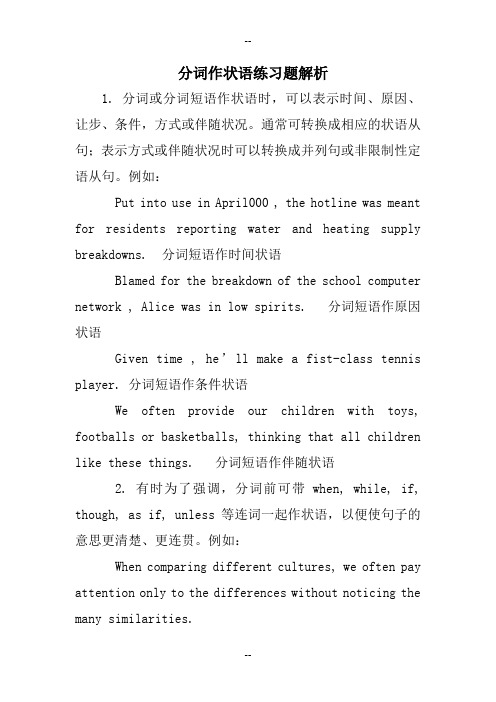
分词作状语练习题解析1. 分词或分词短语作状语时,可以表示时间、原因、让步、条件,方式或伴随状况。
通常可转换成相应的状语从句;表示方式或伴随状况时可以转换成并列句或非限制性定语从句。
例如:Put into use in April000 , the hotline was meant for residents reporting water and heating supply breakdowns. 分词短语作时间状语Blamed for the breakdown of the school computer network , Alice was in low spirits. 分词短语作原因状语Given time , he’ll make a fist-class tennis player. 分词短语作条件状语We often provide our children with toys, footballs or basketballs, thinking that all children like these things. 分词短语作伴随状语2. 有时为了强调,分词前可带when, while, if, though, as if, unless等连词一起作状语,以便使句子的意思更清楚、更连贯。
例如:When comparing different cultures, we often pay attention only to the differences without noticing the many similarities.Though tired, he still continued reading.3. 现在分词和过去分词作状语时的用法比较。
不管是现在分词还是过去分词单独作状语,其逻辑主语必须与主句的主语一致。
分词作状语通常可转换成一个相应的状语从句或并列句,如果状语分句或并列句中的谓语动词为被动结构,就用过去分词;如果状语分句或并列句中的谓语动词为主动结构,就用现在分词。
初二英语分词作状语用法单选题40题
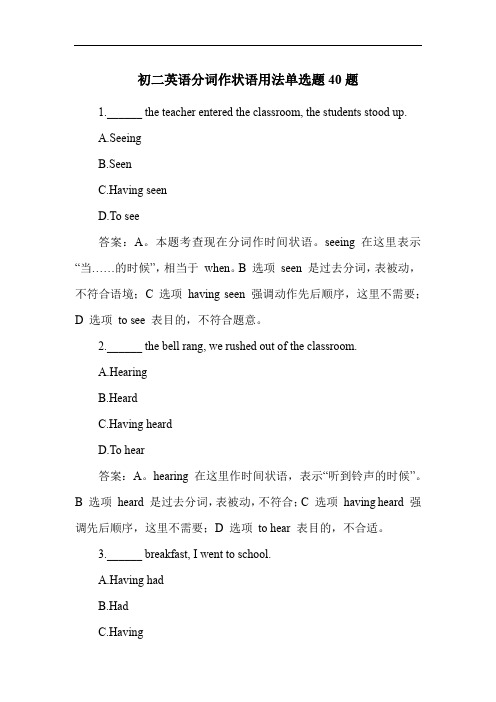
初二英语分词作状语用法单选题40题1.______ the teacher entered the classroom, the students stood up.A.SeeingB.SeenC.Having seenD.To see答案:A。
本题考查现在分词作时间状语。
seeing 在这里表示“当……的时候”,相当于when。
B 选项seen 是过去分词,表被动,不符合语境;C 选项having seen 强调动作先后顺序,这里不需要;D 选项to see 表目的,不符合题意。
2.______ the bell rang, we rushed out of the classroom.A.HearingB.HeardC.Having heardD.To hear答案:A。
hearing 在这里作时间状语,表示“听到铃声的时候”。
B 选项heard 是过去分词,表被动,不符合;C 选项having heard 强调先后顺序,这里不需要;D 选项to hear 表目的,不合适。
3.______ breakfast, I went to school.A.Having hadB.HadC.HavingD.To have答案:A。
having had breakfast 表示“吃完早餐后”,现在分词的完成式强调动作发生在谓语动词之前。
B 选项had 不能直接作状语;C 选项having 不强调先后顺序;D 选项to have 表目的,不符合。
4.______ finishing my homework, I watched TV.A.WhenB.WhileC.AfterD.Having finished答案:D。
having finished my homework 表示“完成作业后”,现在分词的完成式作时间状语。
A 选项when 和 B 选项while 引导时间状语从句,这里不需要从句;C 选项after 后接动名词或句子,没有现在分词的完成式表意准确。
高中英语语法—过去分词作状语讲义+练习题
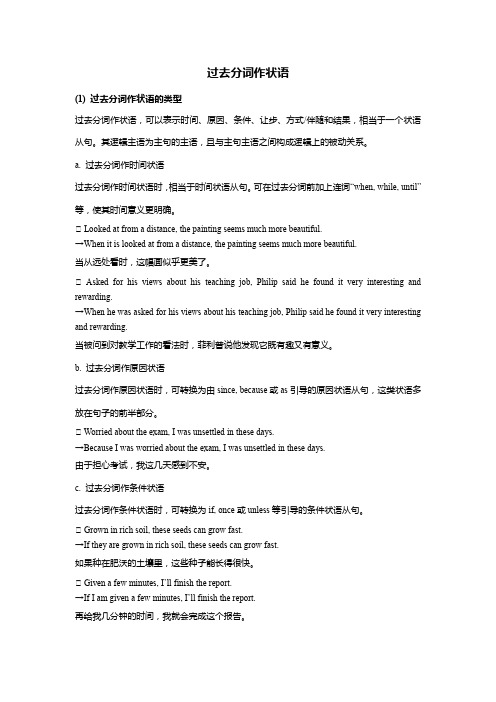
过去分词作状语(1) 过去分词作状语的类型过去分词作状语,可以表示时间、原因、条件、让步、方式/伴随和结果,相当于一个状语从句。
其逻辑主语为主句的主语,且与主句主语之间构成逻辑上的被动关系。
a. 过去分词作时间状语过去分词作时间状语时,相当于时间状语从句。
可在过去分词前加上连词“when, while, until”等,使其时间意义更明确。
◆ Looked at from a distance, the painting seems much more beautiful.→When it is looked at from a distance, the painting seems much more beautiful.当从远处看时,这幅画似乎更美了。
◆ Asked for his views about his teaching job, Philip said he found it very interesting and rewarding.→When he was asked for his views about his teaching job, Philip said he found it very interesting and rewarding.当被问到对教学工作的看法时,菲利普说他发现它既有趣又有意义。
b. 过去分词作原因状语过去分词作原因状语时,可转换为由since, because或as引导的原因状语从句,这类状语多放在句子的前半部分。
◆ Worried about the exam, I was unsettled in these days.→Because I was worried about the exam, I was unsettled in these days.由于担心考试,我这几天感到不安。
c. 过去分词作条件状语过去分词作条件状语时,可转换为if, once或unless等引导的条件状语从句。
高中英语过去分词作状语习题(含答案)
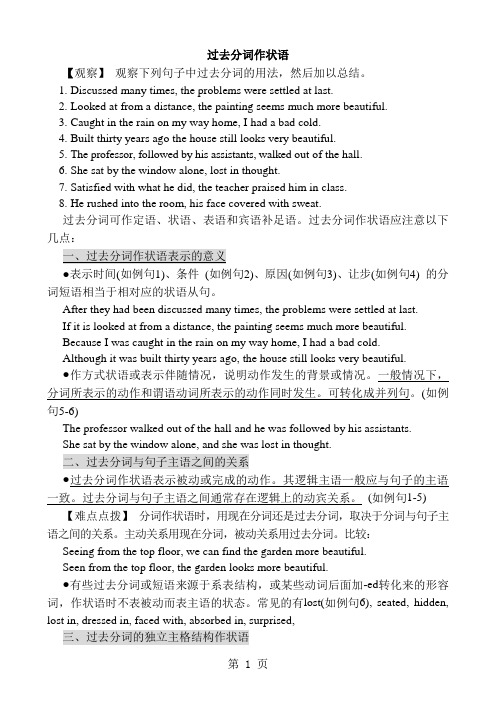
过去分词作状语【观察】观察下列句子中过去分词的用法,然后加以总结。
1. Discussed many times, the problems were settled at last.2. Looked at from a distance, the painting seems much more beautiful.3. Caught in the rain on my way home, I had a bad cold.4. Built thirty years ago the house still looks very beautiful.5. The professor, followed by his assistants, walked out of the hall.6. She sat by the window alone, lost in thought.7. Satisfied with what he did, the teacher praised him in class.8. He rushed into the room, his face covered with sweat.过去分词可作定语、状语、表语和宾语补足语。
过去分词作状语应注意以下几点:●表示时间(如例句1)、条件(如例句2)、原因(如例句3)、让步(如例句4) 的分词短语相当于相对应的状语从句。
After they had been discussed many times, the problems were settled at last.If it is looked at from a distance, the painting seems much more beautiful.Because I was caught in the rain on my way home, I had a bad cold.Although it was built thirty years ago, the house still looks very beautiful.●作方式状语或表示伴随情况,说明动作发生的背景或情况。
分词做状语的练习题及答案

分词做状语的练习题及答案分词做状语的练习题及答案分词作为一种常见的语法形式,经常用来修饰句子的主语、宾语或者作状语。
在实际应用中,正确使用分词可以使句子更加流畅和准确。
下面是一些分词做状语的练习题及答案,帮助读者更好地理解和掌握这一语法知识。
练习题一:1. Walking along the street, ________.2. Exhausted from the long journey, ________.3. With a big smile on her face, ________.4. Surprised by the sudden news, ________.5. Having finished his homework, ________.练习题二:1. __________, she couldn't help but burst into tears.2. __________, the children ran towards their parents.3. __________, the car came to a screeching halt.4. __________, the dog wagged its tail happily.5. __________, the flowers bloomed beautifully.答案一:1. Walking along the street, I saw an old friend.2. Exhausted from the long journey, he decided to take a nap.3. With a big smile on her face, she accepted the award.4. Surprised by the sudden news, they couldn't believe their ears.5. Having finished his homework, he went out to play with his friends.答案二:1. Overwhelmed by sadness, she couldn't help but burst into tears.2. Excited to see their parents, the children ran towards them.3. Frightened by the loud noise, the car came to a screeching halt.4. Delighted by the owner's return, the dog wagged its tail happily.5. Nurtured by the warm sunlight, the flowers bloomed beautifully.通过以上的练习题,我们可以看到分词作为状语的用法。
过去分词做状语同步练习
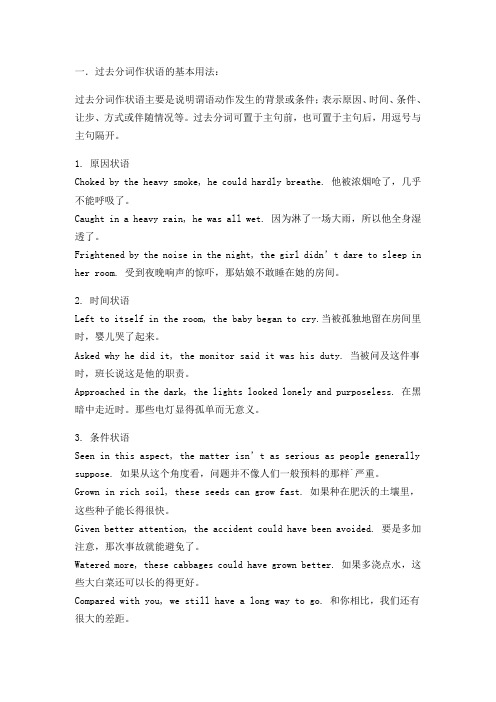
一.过去分词作状语的基本用法:过去分词作状语主要是说明谓语动作发生的背景或条件;表示原因、时间、条件、让步、方式或伴随情况等。
过去分词可置于主句前,也可置于主句后,用逗号与主句隔开。
1. 原因状语Choked by the heavy smoke, he could hardly breathe. 他被浓烟呛了,几乎不能呼吸了。
Caught in a heavy rain, he was all wet. 因为淋了一场大雨,所以他全身湿透了。
Frightened by the noise in t he night, the girl didn’t dare to sleep in her room. 受到夜晚响声的惊吓,那姑娘不敢睡在她的房间。
2. 时间状语Left to itself in the room, the baby began to cry.当被孤独地留在房间里时,婴儿哭了起来。
Asked why he did it, the monitor said it was his duty. 当被问及这件事时,班长说这是他的职责。
Approached in the dark, the lights looked lonely and purposeless. 在黑暗中走近时。
那些电灯显得孤单而无意义。
3. 条件状语Seen in this aspect, the matter isn’t as serious as people generally suppose. 如果从这个角度看,问题并不像人们一般预料的那样`严重。
Grown in rich soil, these seeds can grow fast. 如果种在肥沃的土壤里,这些种子能长得很快。
Given better attention, the accident could have been avoided. 要是多加注意,那次事故就能避免了。
分词作状语的解题技巧(四)
分词作状语的解题技巧(四)七、用作结果状语1. 典型例句He fired, killing one of the passers-by. 他开枪了,打死了一个过路人。
He died, leaving his wife with five children. 他死了,留下他妻子和五个儿子。
It rained and rained, vehicles bogged and bridges washed out. 雨不停地下,车辆陷入泥沼,桥梁被水冲去。
2. 理解技巧分词(短语)用作结果状语时,通常可转换成并列句,如上面两句也可转换成:He fired and killed one of the passers-by.He died and left his wife with five children.It rained and rained, and vehicles were bogged and bridges were washed out.3. 高考实例(1) He glanced over at her, ______ that though she was tiny, she seemed very well put together. (广东卷)A. notingB. notedC. to noteD. having noted【分析】答案选A,此句也可换成:He glanced over at her and noted that though she was tiny, she seemed very well put together.(2) Oil prices have risen by 32 percent since the start of the year, _____ a recordUS$ 57.65 a barrel on April 4. (山东卷)A. have reachedB. reachingC. to reachD. to be reaching 【分析】答案选B,此句也可换成:Oil prices have risen by 32 percent since the start of the year and reached a record US$ 57.65 a barrel on April 4.。
高考英语语法专项练习:分词作状语 附练习题及答案
高考英语语法专项练习:分词作状语附练习题及答案一、分词作状语1. 分词作状语的基本形式分词作状语是英语中一种常见的短语结构,它由分词(现在分词或过去分词)和修饰语构成,用来表示动作或状态的方式、原因、时间、条件、结果等方面的意义。
分词短语可以放在句子的前面、后面或中间,起到修饰动词、形容词、副词等成分的作用。
2. 分词作状语的用法(1)表示方式:分词短语修饰动词,表示动作的方式。
例如:The boy ran home, whistling happily.那个男孩高高兴兴地哨着曲子跑回家。
(2)表示原因:分词短语修饰动词,表示动作的原因。
例如:Feeling tired, she went to bed early.由于感到疲劳,她早早地上床睡觉了。
(3)表示时间:分词短语修饰动词,表示动作的时间。
例如:Having finished his homework, he went out to play.他做完作业后就出去玩了。
(4)表示条件:分词短语修饰动词,表示动作的条件。
例如:Being rainy, we decided to stay indoors.由于天气雨天,我们决定呆在室内。
(5)表示结果:分词短语修饰动词,表示动作的结果。
例如:The boy fell off his bike, hurting his knee.那个男孩从自行车上摔下来,伤了膝盖。
3. 分词作状语的构成(1)现在分词作状语通常用来表示动作进行的方式、原因、时间、条件等,常常放在谓语动词之后,或者放在句首,用逗号与句子分开。
例如:He walked down the street, whistling a tune.他哼着曲子沿街走去。
Whistling a tune, he walked down the street.哼着曲子,他沿街走去。
(2)过去分词作状语通常用来表示动作已经完成或者被完成的情况,常常放在谓语动词之后,或者放在句首,用逗号与句子分开。
分词作状语(附练习)
分词作状语(附练习)分词作状语是高考的热点和重要考点。
其热点考查内容包括以下两点:一、确定分词形式分词作状语通常放在句首,并且用逗号与主句隔开。
同时,分词作状语时其逻辑主语与主句主语应保持一致。
在确定选择现在分词还是过去分词时,要判断主句主语与分词中心词的关系。
如果句子的主语是动词-ing形式所表示的动作的发出者(即表主动或正在进行),分词形式选用现在分词;如果句子的主语是动词-ed形式所表示的动作的承受者时(即表被动或完成),分词形式选用过去分词。
例如,对于句子“I stretched my hand out for it.”,选项A中没有连词,无法构成并列句或主从复合句,因此要选用非谓语动词形式,根据分词作状语的原则,应选择现在分词,即选项C。
又如,对于句子“Seen from the hill。
XXX.”,分析可知“Seen from the hill”是过去分词作状语,其逻辑主语应与句子的主语一致,即“the park”。
它们之间表示被动关系,因此分词形式用seen。
二、确立句子主语可能是谁在确立句子主语可能是谁时,仍然遵循分词作状语时其逻辑主语与主句主语应保持一致的原则。
反过来要根据分词形式确定句子主语。
例如,对于句子“XXX。
_________.”,分析可知分词作状语中的主语为“they”,因此选项A中的“doctors”不符合逻辑,应选B中的“XXX”。
独立主格结构是一种常用的非谓语动词结构,它由名词或代词与动词-ing形式或动词-ed形式构成。
在这种结构中,分词的逻辑主语与主句的主语可以一致,也可以不一致。
如果分词的逻辑主语与主句的主语不一致,分词需要有自己独立的逻辑主语。
这种结构相当于一个状语从句,常用于修饰主句的动作或状态。
分词形式的选择取决于名词/代词与v-ing/v-ed形式所表示动作的逻辑关系,如果它们之间表示主动或分词动作正在进行,选择现在分词,如果它们之间表示被动或完成,选择过去分词。
高考语法:分词作状语&讲解+练习
高考语法:分词作状语&讲解+练习分词作状语的用法可以肯定地说,分词的状语用法是所有分词用法中最重要的,也是最难掌握的。
历年的高考英语考题也说明,分词作状语的用法是所有分词用法中最常考的。
因此,本文拟对分词作状语的用法作一小结和分析,同时归纳一些行之有效的做题方法和理解技巧,以帮助同学们掌握其用法。
一、用作时间状语1. 典型例句Seeing the cat, the mouse ran off. 见到猫,老鼠就跑了。
The work finished, he went home. 工作做完后,他就回家了。
2. 理解技巧分词(短语)用作时间状语通常可转换成时间状语从句(引导时间状语的从属连词需根据句意来确定),如上面两句也可转换成:When [As soon as] the mouse saw the cat, it ran off.After the work was finished, he went home.3. 高考实例When _______ different cultures, we often pay attention only to the differences without noticing the many similarities. (2006浙江卷)A. comparedB. being comparedC. comparingD. having compared【分析】此题答案选C,分词短语when comparing different cultures 相当于时间状语从句when we compare different cultures。
二、用作原因状语1. 典型例句Being very weak, she couldn't move. 她由于身体虚弱而不能行动。
His car broken down, he had to walk. 他的车坏了,所以只好走路。
- 1、下载文档前请自行甄别文档内容的完整性,平台不提供额外的编辑、内容补充、找答案等附加服务。
- 2、"仅部分预览"的文档,不可在线预览部分如存在完整性等问题,可反馈申请退款(可完整预览的文档不适用该条件!)。
- 3、如文档侵犯您的权益,请联系客服反馈,我们会尽快为您处理(人工客服工作时间:9:00-18:30)。
分词作状语练习题解析1. 分词或分词短语作状语时,可以表示时间、原因、让步、条件,方式或伴随状况。
通常可转换成相应的状语从句;表示方式或伴随状况时可以转换成并列句或非限制性定语从句。
例如:Put into use in April000 , the hotline was meant for residents reporting water and heating supply breakdowns. 分词短语作时间状语Blamed for the breakdown of the school computer network , Alice was in low spirits. 分词短语作原因状语Given time , he’ll make a fist-class tennis player. 分词短语作条件状语We often provide our children with toys, footballs or basketballs, thinking that all children like these things. 分词短语作伴随状语2. 有时为了强调,分词前可带when, while, if, though, as if, unless等连词一起作状语,以便使句子的意思更清楚、更连贯。
例如:When comparing different cultures, we often pay attention only to the differences without noticing the many similarities.Though tired, he still continued reading.3. 现在分词和过去分词作状语时的用法比较。
不管是现在分词还是过去分词单独作状语,其逻辑主语必须与主句的主语一致。
分词作状语通常可转换成一个相应的状语从句或并列句,如果状语分句或并列句中的谓语动词为被动结构,就用过去分词;如果状语分句或并列句中的谓语动词为主动结构,就用现在分词。
例如:When compared with the size of the whole earth , the biggest ocean does not seem big at all.分词部分相当于When the biggest ocean is compared with the size of the whole earth, 主语与分词是被动关系,所以用过去分词。
When comparing it with the size of the whole earth, we find that the biggest ocean does not seem big at all. When we compare it with the size of the whole earth... 主语与分词是主动关系, 所以用现在分词。
Faced with a bill for$10,000, John has taken an extra job.Whenever he was asked why he was late for class, he would answer carelessly, always saying the same thing .注意:1. 现在分词有两种时态:一般式doing和完成式having done。
一般式通常表示与主句的谓语动词所表示的动作同时发生或无先后;完成式则强调分词所表示的动作先于谓语动词所表示的动作。
如:While walking in the street, we met some friendsof ours.Having waited in the queue for half an hour, Tom suddenly realized that he had left his wallet at home.2. 分词的否定式的构成: not +分词。
Not having received a reply, he decided to write again.练习:Part A: Multiple choices.单选1.______,I went to the railway station to see my friend off.A. After eating quickly my dinnerB. After my quickly eating dinnerC. After eating my dinner quicklyD. After eating my quickly dinner2.Although he is considered a great writer,______.A. his works are not widely readB. but his works are not widely readC. however his works are not widely readD. still his works are not widely read3.You will be lateyou leave immediately.A. unlessB. untilC. ifD. Or4.---What was the party like?---Wonderful. It’s years ______I enjoyed myself so much.A. afterB. beforeC. whenD. since5.Mother was worried because little Alice was ill, especially ______Father was away in France.A. asB. thatC. duringD. if6.She thought I was talking about her daughter,______,in fact, I was talking about my daughter.A. whenB. whereC. whichD. while7.When a pencil is partly in a glass of water, it looks as if______.A. breaksB. has brokenC. were brokenD. had been broken8.If we work with a strong will, we can overcome any difficulty, ______great it is.A. whatB. howC. howeverD. whatever9.After living in Paris for fifty years, he returned to the small town ____he grew up as a child.A. whichB. whereC. thatD. when10.After the war, a new school building was set up______ there had once been a theatre.A. thatB. whereC. whichD. when11.Why do you want a new job______ you’ve got sucha good one already?A. thatB. whereC. whichD. when12.---I’m going to the post office.---______you’re there, can you get me some stamps?A. AsB. WhileC. BecauseD. If13.______you’ve got a chance, you might as well make full use of it.A. Now thatB. AfterC. AlthoughD. As soon as14.You should make it a rule to leave things ______you can find them again.A. whenB. whereC. thenD. there15.We’ll have to finish the job,______.A. long it takes howeverB. it takes however longC. long however it takesD. however long it takes16.The WTO cannot live up to its name ______it doesnot include a country that is home to one fifth of mankind.A. as long asB. whileC. ifD. even though17.It is generally believed that teaching is ______it is a science.A. an art much asB. much an art asC. as an art muchD. as much an art as18.A computer can only do _____you have instructed it to do.A. howB. afterC. whatD. when19。
John shut everybody out of the kitchen ________he could prepare his grand surprise for the party.A. whichB. whenC. so thatD. if20. The mother didn’t know____to blame for the broken glass as it happened while she was out.A. whoB. whenC. howD. what21. Don’t be afraid of asking for help ________ it is needed.A. unlessB. sinceC. althoughD. when22.A fast food restaurant is the place, ________, just as the name suggests, eating is performed quickly.A. whichB. whereC. thereD. whatPart B: 状语从句与分词短语作状语的转换① After he finished his homework, he went out to play._____________________, he went out to play.② Because they were blind, how could they know what the elephant looks like?_____________________, how could they know what the elephant looks like?③ If you are travelling north, you must change at Leeds._____________________, you must change at Leeds④ Though he admitted that he had received the stolen jewellery, he deniedhaving taken part in the robbery.⑤ If weather permits, I’ll go there on foot. _____________________, I’ll go there on foot.Part C: Put the following into English.1. _____________________, you must stop this childish behaviour.2. I’ll tell you about it___________________________3. _____________________it began to rain.4. ______________________, there is a way.5. They went ______________________________________.6. ____________________, he left his bag at home.7. 这是如此美好的一天以致于所有学生都外出了。
